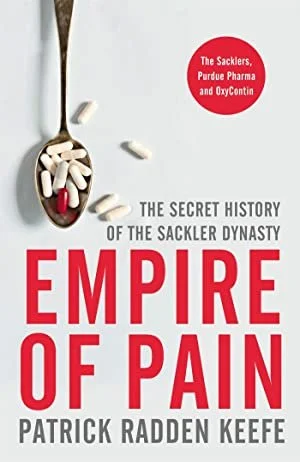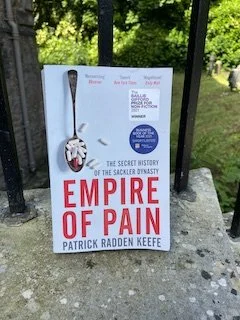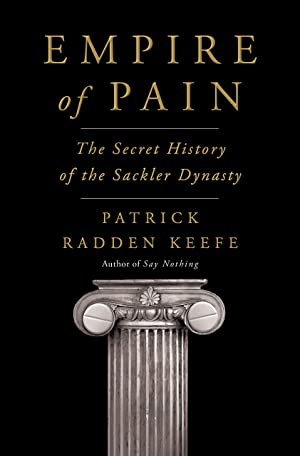Book Review - Empire of Pain - The Secret History of The Sackler Dynasty by Patrick Radden Keefe
“It is a peculiar hallmark of the American economy that you can produce a dangerous product and effectively off-load any legal liability for whatever destruction that product may cause by pointing to the individual responsibility of the consumer.”
Readers of my blog (hello you!) will know I'm a fan of Patrick Radden Keefe, and have previously reviewed ‘Say nothing’, about the troubles in the North of Ireland, and ‘Rogues - true stories of Grifters, Killers, Rebels and Crooks’, a collection of previously published pieces in the New Yorker. This powerful work of nonfiction has been on my shelf for a while now, and I decided that Spring '23 was the time to tackle ‘Empire of pain - a secret history of the Sackler dynasty’. It's taken me six weeks to finish it.
Opioid Epidemic
I think my progress was slow because I was also reading another 500 page epic, 'Demon Copperhead' by Barbara Kingsolver, described as the 'Appalachian David Copperfield' as part of that book features a fictional account of the devastation wreaked by the opioid epidemic in Appalachia. Reading the two books side by side was fairly exhausting, but illuminating.
The side presented by Radden Keefe is that of American capitalism run amok, with an estimated 564,000 dying of a death related to opioids (according to the cdc) of which Oxycontin, produced by Purdue Pharma, was the biggest culprit. Behind it was the secretive Sackler family, who become multi-billionaires but don't like being in the limelight. I was already familiar with them having watched 'Dopesick' and if you're watching 'Succession' they also bear a sneaking resemblance to the Roy family - especially in terms of their skewed attitude towards morality, and how it affects their profits.
The Sackler Dynasty
“The Sackler empire is a completely integrated operation….They could develop a drug, have it clinically tested, secure favorable reports from the doctors and hospitals with which they had connections, devise an advertising campaign in their agency, publish the clinical articles and the advertisements in their own medical journals, and use their public relations muscle to place articles in newspapers and magazines.”
The Sackler dynasty can trace its origins to the incredibly driven Arthur Sackler - copywriter, psychiatrist, and medical publisher. Along with his two brothers, he acquired a small company that eventually became purdue pharma. After making Valium one of the most successful drugs of the ’60s and ’70s, and becoming filthy rich whilst remaining in the shadows, he became interested in his legacy and philanthropy.
The Sackler name began to adorn wings in the Tate and Metropolitan, the Louvre and Smithsonian as well as Yale, Harvard, and Oxford. After Arthur passes, the two remaining brothers develop a drug twice as powerful as Morphine, which amazingly gets passed by the food and drug admin, FDA, though the official who made the final decision later turned up at Purdue on a big salary. Nothing to see here.
Oxycontin
Oxycontin is marked aggressively, with the focus especially on areas such as West Virginia where those workers in physical jobs such as the coal industry were heavily targeted. Physicians were rewarded for prescribing oxygen in as high a dose as possible.
It’s difficult not to be infuriated by this book, as the greedier the Sacklers get, the more people are affected by Oxycontin. The family remain detached and smug and never accept they have done anything wrong, containing to launder their reputation by supporting more art galleries. They hoard their wealth in overseas accounts over the years, knowing full well that when there is a settlement, they will never be held to account or see the inside of a prison cell.
Steal a little and they put you in jail, sang Bob Dylan, steal a lot and they make you king.
The skewed moral compass, the mental gymnastics that the Sackler family perform to justify their actions are hard to believe. Plenty of times I had to put this book down and go for a walk just to calm myself.
Nan Goldin
The Sacklers have an estimated worth of 14 billion and eventually paid 4.5 billion to settle over 3,000 lawsuits. There is an activist campaign led by Nan Goldin to bring to light the devastation wrought caused by the Sacklers, and turning up at art galleries does bring much needed pressure and results. That process is still ongoing, and only recently Oxford university cut ties with the Sacklers.
As you’d expect, this book is meticulously researched, as the author methodically chronicles the rise of the sackler dynasty until it’s eventual disgrace. I read later that he conducted over 200 interviews, and it shows. Radden Keefe himself faces constant legal battles with the Sacklers, even finding himself under surveillance at one stage.
I read another piece a while back after ‘Empire of pain’ won a prize, which talked about the 'controlled fury' of the book and that's a phrase that captures it to a T. It's superbly written, and the narrative has an energy to it that keeps you going, even if I felt angry and exhausted by it at times. A lot of it is hard to believe.
An engrossing piece of work, and a modern classic work of non-fiction.
I read this as part of the 2023 non-fiction challenge hosted over at book’dout.
First published April 13, 2021
I read the Paperback from Picador - 535 pages
Book Review - Empire of Pain - The Secret History of the Sackler Dynasty by Patrick Radden Keefe




